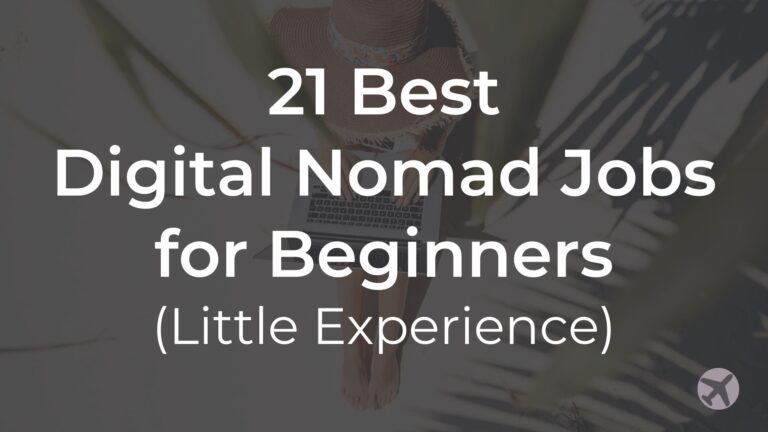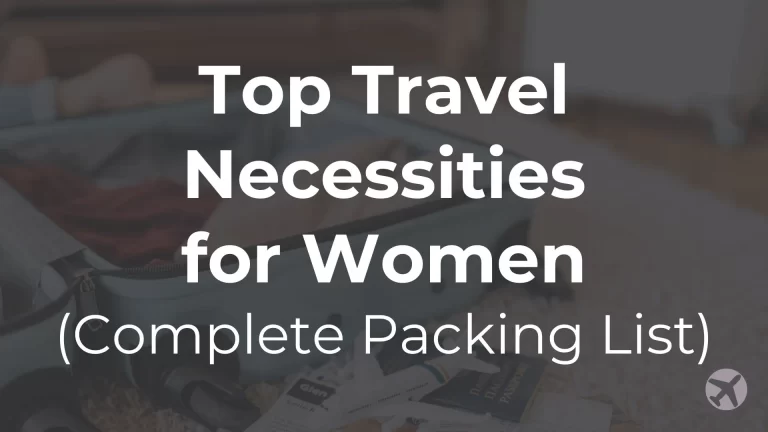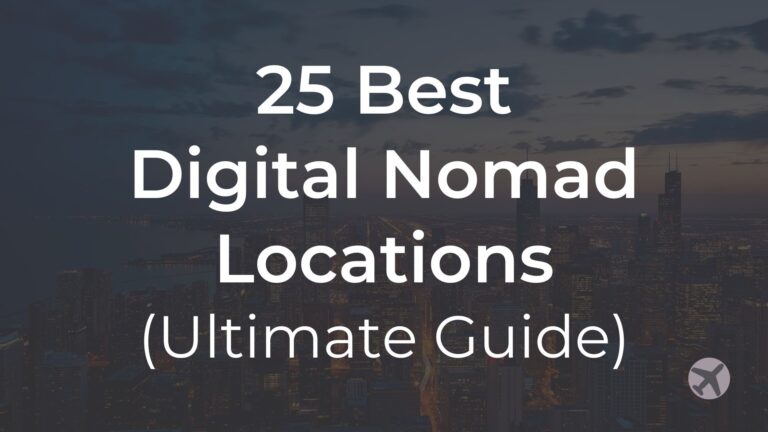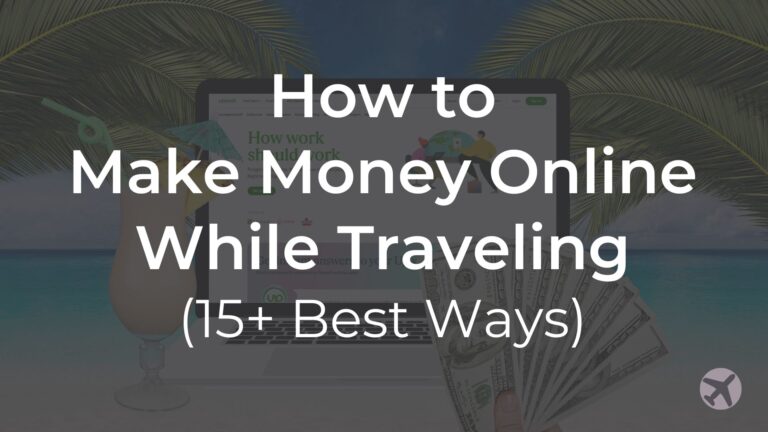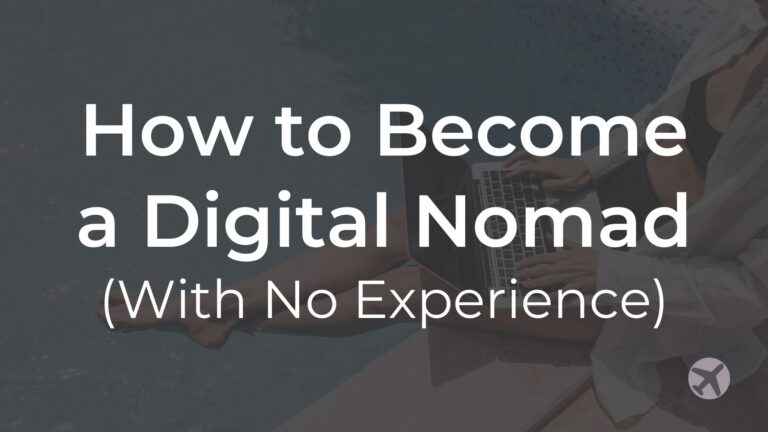What Is a Digital Nomad? (The Secret to Work and Travel)
So, what is a digital nomad you ask?
A digital nomad is someone who has the freedom to make money online from anywhere in the world, as long as they have a reliable internet connection.
If you’re tired of the 9-to-5 grind and crave more flexibility and adventure, the digital nomad lifestyle could be the perfect solution for you!
I’ve been a part-time digital nomad for over two years and it’s been worth every risk.
In this article, I’ll answer all your questions and go into more about what a digital nomad is, how they make a living, some pros and cons of the lifestyle, as well as a checklist to become a digital nomad.
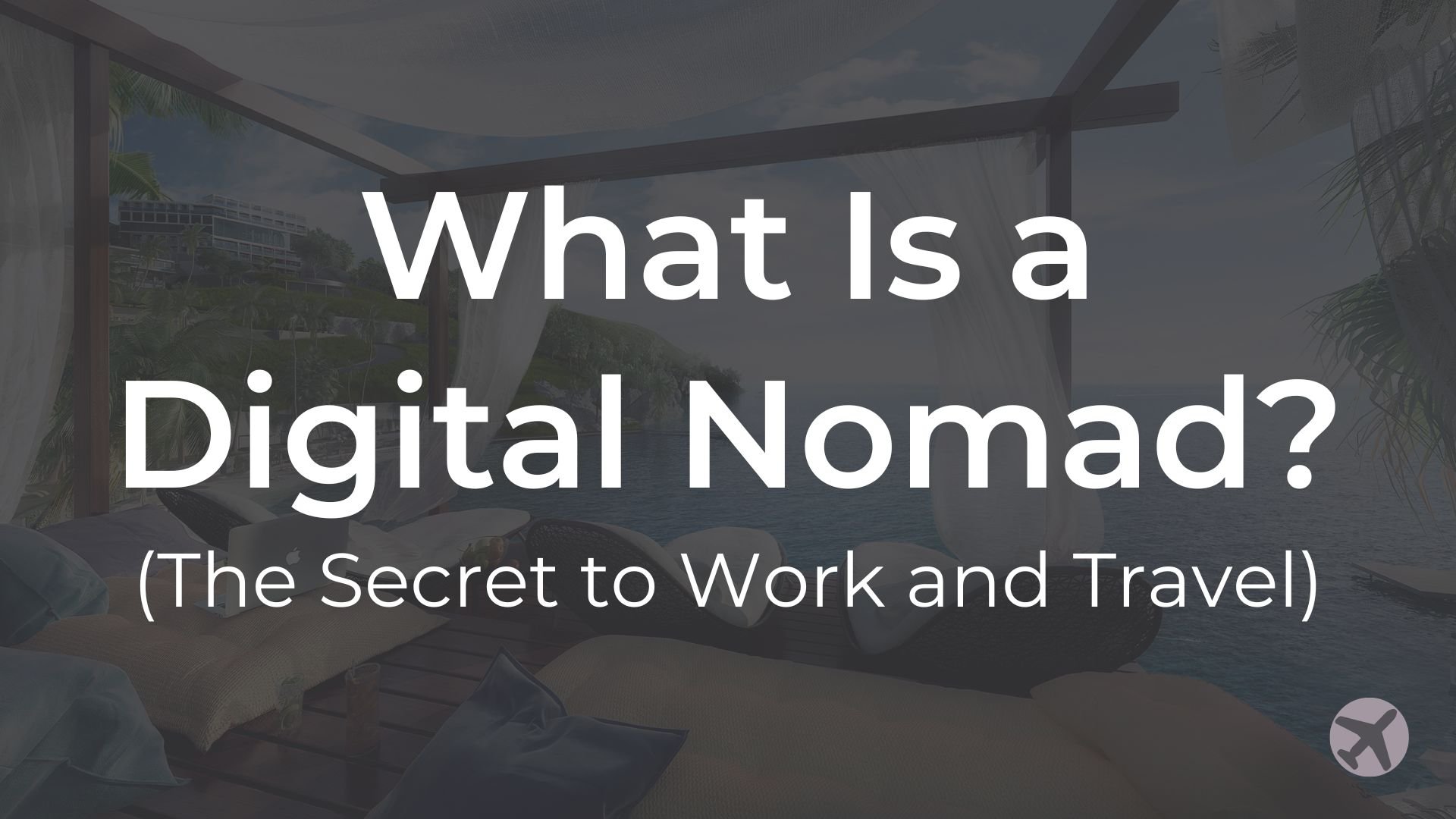
This post may contain affiliate links and is a member of the Amazon Services LLC Associates Program. If you make a purchase using one of these Amazon links, I will receive compensation at no extra cost to you. See my Disclosure Policy for more information.
What Is a Digital Nomad?
A digital nomad is someone who uses technology to work remotely and has the freedom to live and work anywhere in the world. They’re not tied to a physical office or location and can work from coffee shops, co-working spaces, or even the beach. (But personally, I think bringing your laptop to the beach is a little risky)
These nomadic minimalists are usually pros at Marie Kondo’ing their lives – cutting out all the fluff and only bringing the absolute essentials with them on the road. I would know… I explored Europe for 10 weeks with only my carry-on.
Common Misconceptions
Myth: Digital nomads are just people who work from home
Truth: They can work from home if they want, but they can also work from anywhere else in the world.
Myth: Digital nomads are just young people who want to travel the world
Truth: While many digital nomads are young, there are also plenty of older digital nomads who have been working remotely for years.
Myth: Digital nomads are the same as freelancers
Truth: Yes, freelancers are digital nomads, but not all digital nomads are freelancers.
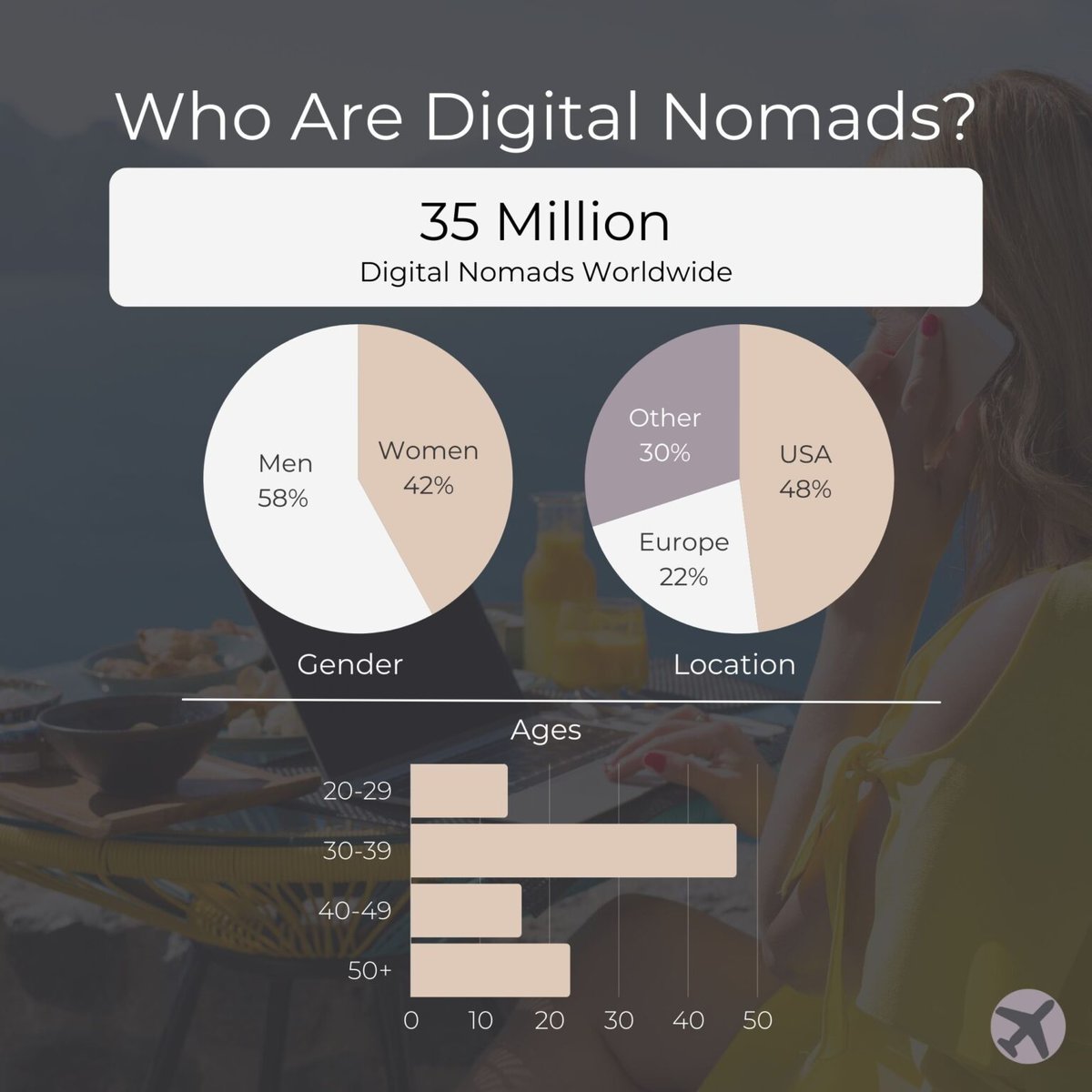
How Many Digital Nomads Are There?
According to a study done by Enterprise Apps Today, there were 35 million digital nomads worldwide as of 2023, and that number has only grown thanks to the world getting more connected and, honestly, people just wanting more from life than a cubicle view.
Who Are These Digital Nomads?
- Age: Digital nomads vary greatly from young adults out of college to seasoned professionals – but the average age is 32.
- Gender: Typically, digital nomads consist of 58% men and 42% women.
- Nationality: The largest group of digital nomads make up 48% from the United States and 22% from Europe.
How Do Digital Nomads Make Money?
There are four types of jobs for digital nomads:
- Full-time remote employment
- Short-term / seasonal day jobs
- Freelancing
- Entrepreneurship
With the exception of short-term jobs, most digital nomads use the internet to bring in income while they’re off traveling the world.
But while most digital nomads are remote workers, not all remote workers are digital nomads.
Digital nomads vs remote workers: Digital nomads have location-independence.
Nomads can earn a living from different locations, while a remote worker is typically tied down to one location due to healthcare requirements, time zone differences, taxes, etc.
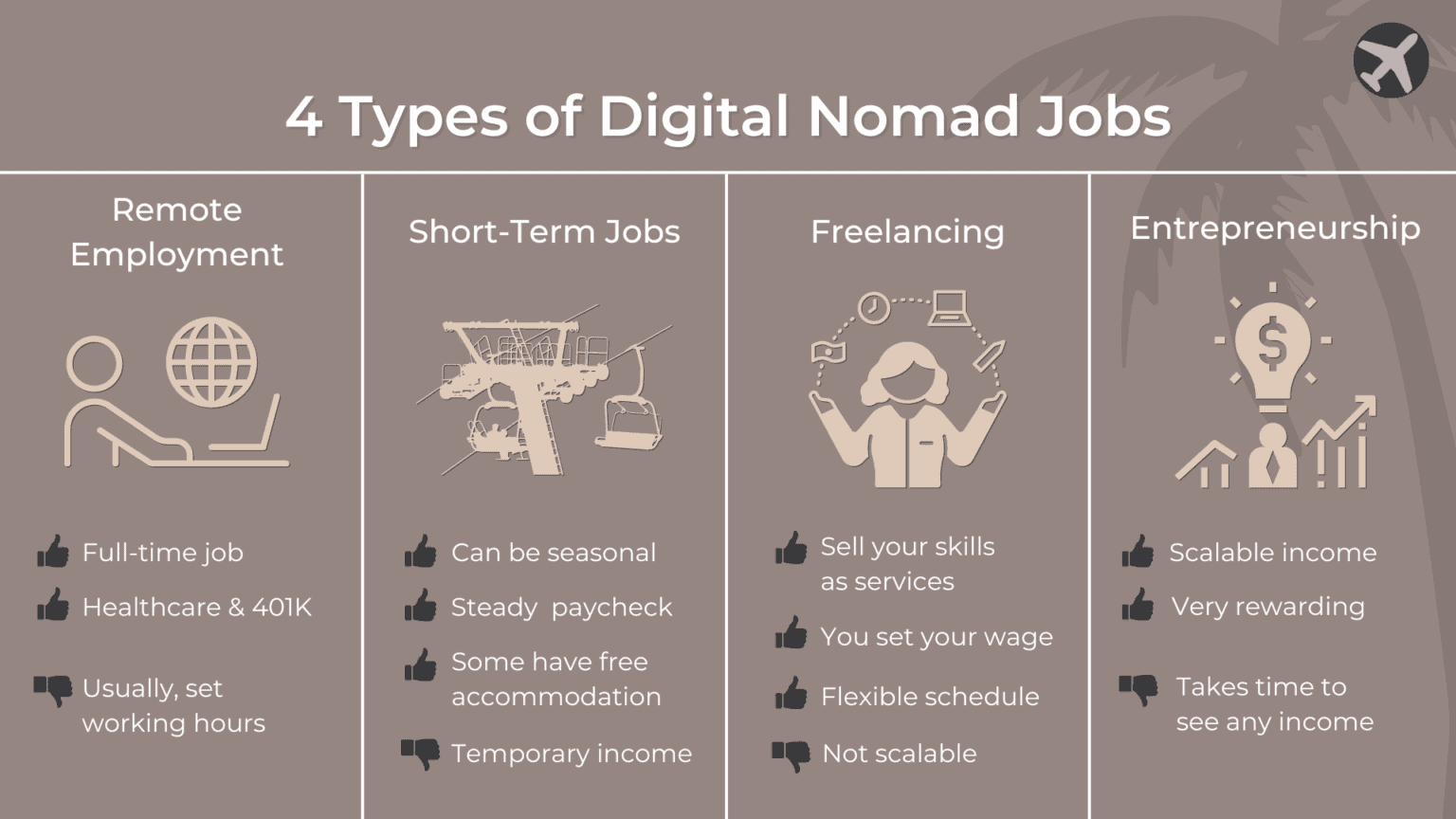
Common Jobs for Digital Nomads
Here are some of the best jobs for digital nomads that can be done remotely:
- Freelance Writing and Design: Offering skills on a freelance basis, crafting content, designing websites, or providing other creative services.
- Digital Marketing: SEO specialist, social media manager, FB ads manager, and more.
- Tech and Startups: Software development, programming, and tech consultancy.
- Teaching and Coaching: Online education and coaching have opened new avenues for nomads to teach languages, fitness, business strategies, and more.
- Remote Corporate Roles: More and more companies are open to remote workers, offering positions in marketing, HR, project management, and customer support that can be done from anywhere.
Finding Remote Work as a Digital Nomad
Finding work that allows you to work remotely is essential (duh!).
Luckily, there are many platforms and resources available to help you find work as a freelancer or remote employee.
- Build a Portfolio – Got a knack for writing? Or maybe video editing like myself? Create a portfolio online to show off what you can do.
- Hit Up Job Boards – Sites like Upwork, Freelancer.com, and Fiverr are where many digital nomads start out. Yes, there’s competition, but it’s also packed with opportunities to build your rep. If you’re looking for a remote position with a company, check out job boards like We Work Remotely, LinkedIn, Indeed, and Flex Jobs.
- Network Like It’s Your Job – Because well, finding work kind of is your job now. Join online communities of digital nomads. Places like Nomad List and various Facebook groups are gold mines for advice and opportunities.
- Keep Learning – The digital world moves fast; stay ahead by constantly learning new skills that enhance your remote work appeal.
- Patience Pays Off – If at first you don’t succeed… well, welcome to the club! Keep tweaking your approach until you find what works for YOU.
How Much Do Digital Nomads Make?
On average, digital nomads make between $50K and $250K.
I know that’s a pretty wide range, but it’s because there’s a million different job possibilities for nomads. But a lot of them make over $100K and still fill up their savings accounts after all that traveling – that’s pretty impressive!
Where Do Digital Nomads Live?
There’s endless choices when it comes to living as a nomad – you just need to figure out your priorities in order to pick the best city and accommodations for you.
Popular Digital Nomad Destinations
Every spot has its unique charm, quirks, and – let’s be real – WIFI speeds. Here are some of the best locations for digital nomads:
- Southeast Asia: Places like Bali, Chiang Mai, and Ho Chi Minh City are favorites for their affordability, vibrant culture, and digital nomad communities.
- Europe: Cities like Lisbon and Berlin attract nomads with their rich history, culture, and coworking spaces.
- Latin America: Medellín and Mexico City are popular for their weather, culture, and lower cost of living.
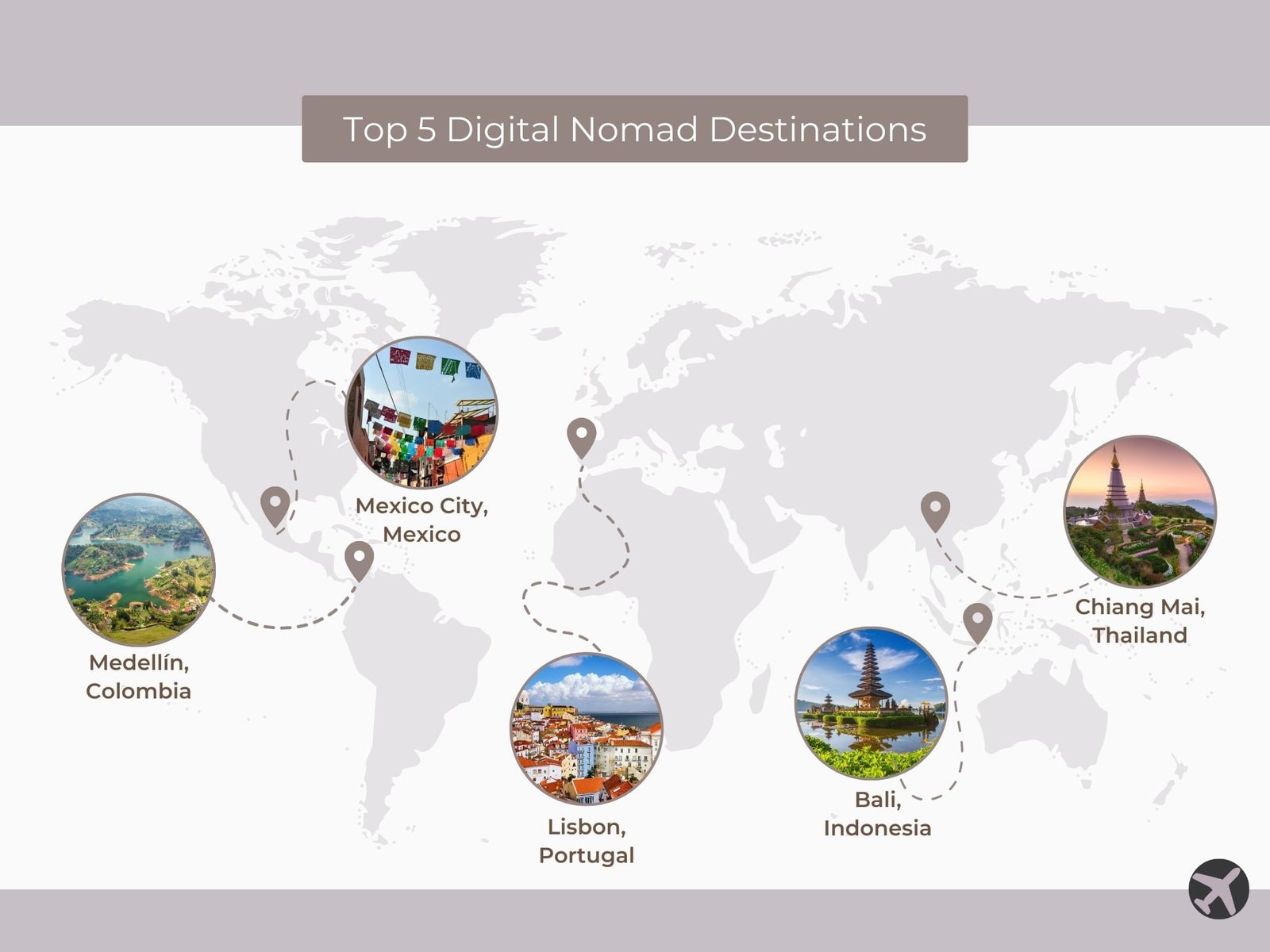
Accommodations for Living as a Digital Nomad
Finding the perfect digital nomad accommodation can feel like searching for a unicorn, but there’s actually a lot of options out there.
- Co-living spaces: These spots offer not just a bed but also shared workspaces to live with like-minded travelers.
- Airbnb or VRBO: Renting an apartment or room gives you privacy and comfort.
- Hostels: Budget-friendly and social, hostels are the go-to for those who love making friends at breakfast.
- House sitting or swapping: Swap houses with people around the globe using Homeexchange! (This is what I do, and I love it) Or opt for house-sitting and watching people’s pets while they’re out of town.
- Hotels with long-term rates: Some hotels offer deals for stays longer than a week or month.
- RVs or vans: Drive your home wherever you want to go next – perfect for those who get bored easily.
- Work exchange programs: Trade skills or labor for accommodation – like helping out in a hostel or farm in exchange for a place to sleep and sometimes food too.
Safety and Security Issues
As you’re traveling around and experiencing new cultures, safety and security should be a top priority.
Before you choose your destination, make sure to research the area and check the crime rate. It’s also a good idea to invest in travel insurance in case any of your valuables get stolen.
When it comes to accommodation, make sure to choose a reputable provider and read reviews from other travelers. You should also have a backup plan in case of emergency, such as a copy of your passport and important documents stored online.
I learned this the hard way after my entire wallet got stolen in Bangkok. All my money and credit cards. Thank the lord my brother’s friend happened to also be in Bangkok and he was able to lend me money for the time being. I have no idea what I would have done otherwise!
Now, I never bring my full wallet with me out into town, usually just some cash and one card.
What Are the Legal and Financial Aspects of a Digital Nomad Lifestyle?
You’ll need to research the visa, work permit, tax, and insurance requirements for each country you’ll be visiting.
Visas and Work Permits
Some countries have strict rules about working while on a tourist visa, and you could face fines or even deportation if you’re caught. It’s important to do your homework and make sure you have the proper documentation before you start working in a new country.
Here’s what you need to know:
- Digital nomad visas are becoming a thing – Governments are catching up with the digital age. Countries like Estonia and Barbados are rolling out special visas aimed at attracting digital nomads. These often include perks but come with their unique requirements.
- Length of stay varies widely – Some digital nomad visas allow you to linger for years, while others may only let you stay a few months before requiring renewal or departure.
- Work permits aren’t always straightforward – Landing in a new country doesn’t mean you can start working right away. Most places require a work permit on top of a visa if you’re planning to make money while there – even digitally.
- The application process takes time – Don’t expect instant approval; securing the correct visa or permit can take weeks or even months. So start submitting applications early.
- Read the fine print – Each visa or permit comes with strings attached, like minimum income requirements or mandatory local spending.
Taxes and Insurance
As a digital nomad, you may have to deal with taxes in multiple countries.
This can be complicated, so it’s a good idea to consult with a tax professional who has experience working with digital nomads. They can help you understand your tax obligations and make sure you’re not overpaying or underpaying.
You should also consider getting travel medical insurance that will cover you while you’re traveling. Many countries actually demand proof of health insurance before they even let you in or allow you to apply for a work permit or visa. This makes sure that you won’t be a burden on their healthcare system.
💡Pro Tip for Taxes: Make sure you’re putting more than enough of your income aside for taxes so you’re not hit with a big bill that you can’t pay. Also when you’re self-employed, many expenses can be deducted, so make sure you keep track of all your spending.
Budgeting and Expenses
You need to keep track of your income and expenses and make sure you’re not overspending. It’s a good idea to create a budget and stick to it, so you don’t run out of money while you’re traveling. My favorite budget app is YNAB – I use it religiously!
You should also be aware of the costs associated with being a digital nomad. This can include things like coworking spaces, travel expenses, and equipment costs. Make sure you have a good understanding of your expenses so you can plan accordingly.
You also might want to consider getting a travel credit card to help you reduce costs on flights and hotels.

Benefits of Being a Digital Nomad
Digital Nomads Travel and Work From Anywhere
The most obvious advantage of being a digital nomad is the ability to have the world as your office. This lifestyle is all about freedom and adventure, allowing you to explore new cultures while paying the bills with your remote job.
You Can Live a More Flexible and Nomadic Lifestyle
Forget the boring 9-to-5 routine – being a digital nomad means you can have the location and time freedom to hit the road whenever you want.
The point is, there isn’t a strict work schedule unless you create one for yourself.
You Can Be More Productive and Creative
Jumping from one location to another does wonders for your brain. Getting work done in new environments sparks creativity and pushes productivity levels through the roof. But if you’re easily distracted, this could be a challenge.
You Get to Meet New and Interesting People
Meet other digital nomads everywhere you go. Each person you encounter adds a new color, perspective, or story that wasn’t there before.
Plus, attending local meetups or events can firmly root you into these vibrant digital nomad communities like never before. It’s here where work-life balance takes on new meanings as professional connections often blur into personal ones over shared experiences and tales of adventures gone wrong.
Disadvantages of Being a Digital Nomad
Time Zones
The first disadvantage of traveling and working is dealing with being in a different time zone than all your family and friends. Sometimes you’ll feel like calling a loved one, but then remember it’s the middle of the night back home.
And if you have a more traditional job working full-time remotely, then you might need to often work in the evening to keep the same schedule as your coworkers. While many remote jobs allow you to work virtually, you should try to work for a company with flexible jobs that let you work at any hour.
Visa Requirements
As we touched on earlier, you’ll need to dive into the nitty-gritty of visa processes and work permits. There’s nothing worse than not getting let into a country because you don’t have the proper paperwork – especially if you’ve already booked non-refundable accommodations.
Potentially Unstable Income
Making money as a digital nomad isn’t always smooth sailing.
It’s crucial to prepare for your income to experience ups and downs and to plan your budget conservatively.
Most digital nomads tend to have multiple streams of income to help with this income fluctuation so they’re not left in panic mode when one job finishes or goes south. Developing a sound financial strategy isn’t just smart; it’s necessary for riding out the unpredictable waves of nomadic life without wiping out.
Good Internet Connection
Staying connected is essential for digital nomad work. And sometimes, this can be hard to find. Double-check that where you’re staying has reliable WIFI, and see if you can find any reviews from fellow nomads regarding the internet connection.
You should also have backup plans like a local SIM card loaded with data – it’s essential gear for your digital nomad toolkit.
Loneliness
The irony of a digital nomad lifestyle is that you’re connected everywhere electronically, but disconnected physically.
That’s why it’s essential to check out digital nomad communities – especially if you’re more of an introvert. Making friends with like-minded digital nomads allows you to share stories and similar struggles, making sure that you kick this digital nomad loneliness to the curb.

Digital Nomad Checklist: Essentials for a Successful Transition
Have a Job That Allows You to Be Location-Independent
No surprise here – you’ll need a solid way to make income while you’re out and about. So naturally, having a job that lets you be location-independent is the first step to life as a digital nomad.
Check Your Tech and Software
Make sure all your digital nomad gear is up-to-date and working properly. The last thing you want is your laptop crashing while you’re abroad.
Don’t forget a durable case because working in coffee shops can mean lots of spilling liquid.
💡Pro Tip: Make sure to backup everything twice while you’re traveling because “my hard drive took a swim” won’t impress your clients.
Figure Out Your Taxes
If you’re taking the self-employment or entrepreneur route, figuring out your new tax system can be hard! You’ll also want to figure out the taxes in your new country according to which visa you’ll be using.
I spent hours watching YouTube videos on quarterly taxes for self-employment.
Just make sure to keep track of every penny you make and where you spend it. And don’t forget to set aside about 20%-30% of your income for taxes.
Get an Up-To-Date Passport
Don’t forget your passport!
Certain countries’ visa rules need a minimum of blank pages and an expiration date over six months away. Double-check your passport before you go.
💡Pro Tip: Keep a photocopy or digital scan handy in case the original decides to take an unplanned vacation without you.
Get Health Insurance
Think of all the exotic foods that could wage war on your stomach or the adventurous activities that look cool until you twist an ankle.
Luckily, some insurers are stepping up their game with policies made just for folks who carry their office in a backpack. The most common health insurance for digital nomads are SafetyWing and World Nomads.
Check the Visa Requirements
Get familiar with each country’s rules because they change as often as your travel destinations! Some spots might just need a tourist visa, but others have these new digital nomad visas.
Trust me, figuring this out is way better than being turned away at the airport or facing legal issues later on. So do your homework, check those requirements twice, or maybe even three times, to make sure you’re all set to explore every part of the world.
Book Your Plane Ticket
Wait to buy your ticket until 1-2 months before you leave. It helps in case plans change – nomad life is unpredictable. Start with a one-way ticket for flexibility to follow opportunities and adventures.
You’ll also want to find the right pace for your travels to balance rest, routine, travel, and work. This is super important if you’re traveling alone for the first time because you’ll need to figure out your own limits and adjust accordingly, without being trapped in by a plane ticket.
Book Your Accommodation
Finding the right place to stay isn’t just about comfort and WIFI, but it’s also strategic. Oftentimes, the best work and travel lifestyle corresponds with your travel style.
Many working nomads stay in one city for a longer period and live a slow travel style. This allows them plenty of time to explore the city like a local while still having time to work.
Pack Light
Digital nomads need to pack light! No one wants to drag a bulky suitcase through narrow, cobbled streets or up flights of stairs in an apartment building with no elevator.
That’s why minimalist packing for long-term travel becomes your best friend. Choose items that serve multiple purposes – a scarf that doubles as a blanket on chilly plane rides or shoes perfect for both hiking and a casual night out. Capsule wardrobes will become your new best friend.
And when it comes to gear, only pack the travel necessities – making sure they’re versatile and lightweight.

The Future of Digital Nomadism
The world of digital nomads is booming! More folks are craving the freedom to work from anywhere.
Cities and countries are stepping up to embrace remote work with the advancements of digital nomad visas and co-living accommodations.
As tech advances, expect more services and tools to work remotely, building a solid foundation for this lifestyle.
Digital nomadism thrives on tech and globalization, offering unmatched freedom to work from anywhere with an internet connection. The U.S. has seen a surge in independent workers embracing nomadic living, with millions set to follow. This shift isn’t just a fad; it marks a significant shift in how we view work and life in today’s world.
Conclusion: What Is a Digital Nomad?
Digital nomads live the dream, working and traveling to different locations all over the world. They embrace a life where work meets adventure, fueled by WIFI and wanderlust. Every day brings a new backdrop for their Zoom meetings, from bustling city streets to quiet mountain retreats.
This lifestyle isn’t for everyone. But if you’re ready to build a digital nomad career on your own terms with the opportunity to travel wherever you want, whenever you want, check out my full guide on how to become a digital nomad and start plotting your escape into the world of remote work and endless travel.
Frequently Asked Questions
What would be the pros and cons of living as a nomad?
One pro of being a nomad is the amazing freedom to explore and work from anywhere, which boosts personal growth and broadens your global perspectives. But some cons are dealing with housing changes, tricky relationship dynamics, and the hassle of finding good internet access or workspaces. The digital nomad life is all about being adaptable and independent!
How do digital nomads make money?
Digital nomads make money by using their ability to work remotely in various fields. Some of the best digital nomad jobs include freelance writing, web development, online teaching, and virtual assisting, all of which allow for flexibility and independence.
Are digital nomads wealthy?
While there are plenty of wealthy digital nomads, it’s not a requirement. Successful digital nomads need to know how to manage their finances well to sustain their lifestyle – so smart financial planning is definitely a prerequisite.
What is the downside of being a digital nomad?
The downside of being a digital nomad includes the constant need for reliable internet, the challenge of maintaining relationships over long distances, and potential feelings of isolation and loneliness. Also, navigating different time zones can disrupt work-life balance and personal routines.

